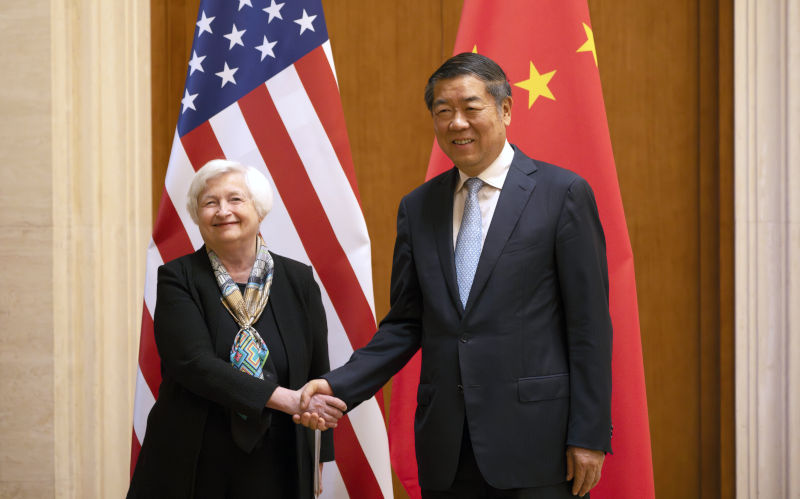Yellen’s Beijing visit: US-China economic reality is starting to bite
July 12, 2023
On China, Biden is faced with both a political problem, represented by his secretary of state, and an economic reality, represented by the Treasury secretary. Yellen’s visit suggests economics may be starting to play a larger role in the bilateral relationship, but the US will need to demonstrate consistent sincerity to see improvement in ties.
__
US Treasury Secretary Janet Yellen’s trip to Beijing is part of the Biden administration’s push to reinstate lines of communication with its Chinese counterpart. A senior Treasury official told reporters that the intent of the trip is to “deepen and increase the frequency of communication” between the two countries, “stabilise the relationship, avoid miscommunication and expand collaboration where possible”.
The intent, if genuine, is welcome. However, that intent is undermined by the persistent perfidy of the United States. Perfidy is the state of being deceitful and untrustworthy, and it is against this background that Yellen’s visit must be assessed.
Less than three weeks ago, US Secretary of State Antony Blinken visited China and took pains to make it clear that his country does not support Taiwan independence.
Taken at face value, this was a welcome commitment, but within days of Blinken’s return to the United States, he not only accused Beijing of acting in a manner “antithetical” to the status quo, but also endorsed US President Biden’s insulting remarks about Chinese President Xi Jinping, including calling him a dictator.
Biden’s disparaging comments, and his refusal to withdraw them, cast doubt on the sincerity of his attempts to mend ties after several years of bilateral tensions. Likewise, Blinken’s endorsement of Biden’s insults must cast doubt on the sincerity of the statements and commitments he made during his visit to Beijing.
This perfidy strains all relations with China. In February, the US media and political leaders whipped up anti-China sentiment, which led to the shooting down of a Chinese meteorological survey balloon and the sudden cancellation of Blinken’s planned visit to China. For weeks, the media and politicians alleged the balloon had been used to spy on the US.
Last week, a Pentagon spokesman said the balloon did not collect information while flying over the US. The political players who were most vocal in February are now silent.
‘We will act’: Biden raises row over Chinese balloon during State of the Union address
Yellen has a strong record of opposing tariffs and as the cabinet member with the most expertise in monetary policies, she has a better understanding of the economic reality of the US-China relationship. Yellen will bring this background to the table in her discussions with Chinese officials.
On China, Biden is faced with both a political problem and an economic reality. Blinken represents the political problem. Yellen represents the economic reality. The two problems are incompatible. Yellen’s visit suggests the economic reality may be starting to play a larger role in the US-China relationship.
Decades of economic data suggests that Chinese exports have successfully helped keep US inflation low. One could argue that China’s largest global export has been deflation. Walmart, Apple and others rely on “cheap” Chinese products or services and the American consumer has benefited from ever-falling prices.
However, a continuation of the US-China tariff-induced inflationary impact is the last thing that the Biden administration needs right now as the country heads into an election year.
Further adding to the economic pressure are the Biden administration’s whopping infrastructure programme and its protectionist support programme that demand massive levels of borrowing. The financing of this debt will require assurances from China and Japan, the biggest foreign holders of US debt.
Just why China should continue to fund US debt requirements remains an open question when US policy disadvantages China.
The Treasury chief will face questions on the Biden administration’s plans to regulate and potentially cut off US corporate investment in China in what the US classes as “sensitive technologies”.
It is important that communication between the US and China resumes. The fiscal and monetary measures adopted by the United States have a significant impact outside the country. Global economies are held hostage to decisions taken by US policymakers, although the US Treasury and Federal Reserve have no obligation to consider the international impact of their policy decisions. This contempt for their global consequences is giving impetus to the move towards de-dollarisation of the global economy.
Yellen’s reputation means she brings an honesty to the discussions. There is no doubt that serious and fruitful progress can be made in several areas. Her visit has the potential to set the true foundations for responsibly managing the US-China relationship, communicating directly about areas of concern, and working together to address global challenges. These are the objectives set by the Department of Treasury and they are not far off from those of Yellen’s counterparts in China.
At best, Yellen’s visit may see a restoration of the Strategic Economic Dialogue – abandoned by the Trump administration – under which the Treasury secretary met with China’s equivalent every six months.
The unresolved question relates to whether Yellen’s genuine discussion and commitment is strong enough to overcome the perfidy that characterises so many other aspects of the US-China relationship.
First published in the South China Morning Post July 6, 2023

